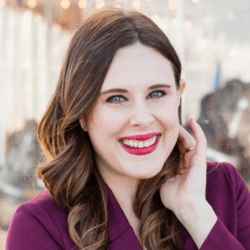How to take care of your teeth
Dentists chew their patient’s ear out on the importance of regular brushing and flossing. And they definitely want you to keep up with those things, but they also wish you would stop these bad habits and start doing some things differently to care for your teeth. Here’s what your dentist wants you to know.

Your teeth won’t get healthier on their own
If the splash of ice-cold water against your pearly whites makes you wince, or you can comfortably chew on only one side of your mouth, you shouldn’t ignore it. You might delay going to a dentist because you’re uneasy about what they’ll say or how much it will cost, but letting it go will only make it worse. “Many dental health problems are unlikely to get better on their own,” says board certified oral and maxillofacial surgeon J. Michael Ray, DDS. “You can avoid most unpleasant experiences in the dental office by seeking care as soon as possible,” alleviating unnecessary pain (and often great expense) by taking care of any problems before they turn into a dental emergency.
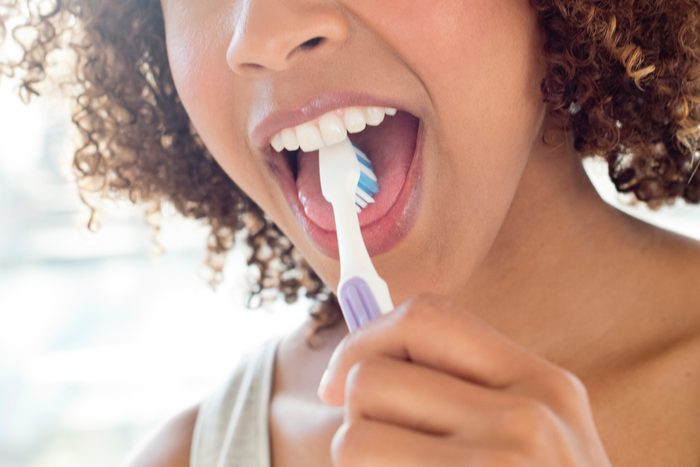
You need to brush more than your teeth
No judgement if you still hum the “Happy Birthday” tune twice a day when you brush. But big judgement (in a kind way, of course) from your dentist if you’re only brushing those babies and forgetting about the rest of your mouth. Most of the time, merely scrubbing your molars won’t prevent cavities or infections. You have to brush your tongue, too. “All the little bumps on the top of your tongue are like a shag carpeting collecting bacteria and debris,” explains dentist Idelle S. Brand, DDS. “If you only brush your teeth and not your tongue, all the germs on your tongue will go right back onto your teeth and gums as soon as you finish brushing your teeth.” And though some recent stories argued that flossing was a waste of time, New York City cosmetic dentist, Timothy Chase, DDS begs to differ. “Cleaning between their teeth is mandatory, despite what the recent ‘fake news’ stories put out there. Using floss or interdental cleaners is just as important to your dental health as brushing your teeth,” he notes. Don’t miss how Covid-19 is affecting dental health.
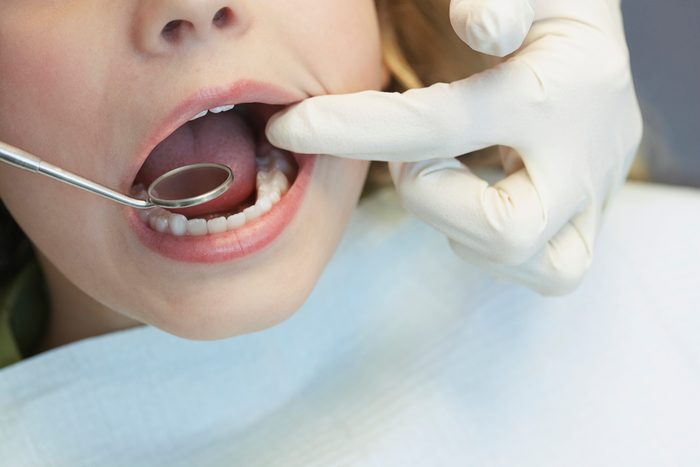
Remember oral health isn’t just about teeth
Bad oral health can result in way more than having a root canal or filling. “Every day there is news that links oral health to overall body health, specifically gum disease to cardiovascular disease, diabetes, and even Alzheimer’s,” Dr. Chase explains. “Skipping regular dental appointments can lead to bigger problems than just bad breath or cavities; It could cause real health problems down the road.” Dentists lament the misconception that they’re just “tooth mechanics.” “In reality, we are doctors of the mouth, bridging the connection between oral health and systemic health,” says Dr. Brand. In fact, dentists often find these health issues first.
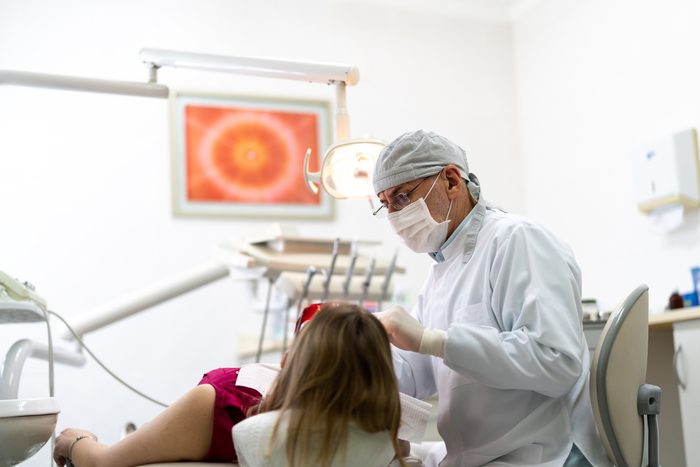
You may need your teeth cleaned more often
Most of us get our teeth cleaned and checked twice a year. But if you have more complicated dental health issues or especially sensitive teeth, there’s a good chance that seeing your dentist more often will prevent bigger—and more expensive—issues. To avoid root canals, bridges, and possible oral surgery, Dr. Chase says to let the dentist prescribe both your toothpaste and your frequency of visits. “Not everyone can remain healthy just seeing the dentist twice a year; many people require additional visits,” he notes. “Especially if they are taking medications, as many prescription medications cause changes in the mouth and really need to be monitored.”
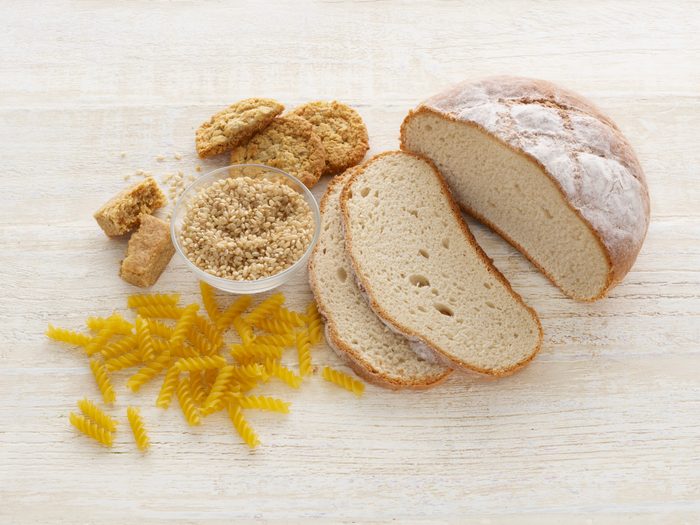
Sugar isn’t limited to sweets
Did your mom ever warn you that sugar rots your teeth? That’s partially correct. While sugar can damage your chompers, it’s not only candy that’s to blame. “Any bacteria causes decay by consuming sugar and producing acid, dissolving the tooth enamel,” explains New York City celeb cosmetic dentist, Lana Rozenberg, DDS. “The list of culprits includes any starch or carbohydrate. So that includes bread, potato, fruit, and pasta, too.” Consuming it on the regular—if you eat a doughnut for breakfast and a candy bar after dinner, for example—ups your risk of cavities, according to dentist Eugene Gamble, DDS. “How frequently you have even a small amount of sugar-containing food or drink is more important than the quantity you have through the day,” he says. “My children are allowed to have candies, but they eat them all in one sitting rather than picking at them through the day. This way there is only one acid attack on the teeth that day and not multiple attacks.”

Don’t do a post-brush rinse
Brush, spit, rinse—right? Wrong. The benefits of cleaning your teeth with toothpaste aren’t limited to the moment you’re doing it, as many formulas offer long-lasting effects on your teeth and overall mouth health. That’s why Dr. Gamble says skipping the last step in your three-part process might yield better results (and fewer cavities). “Toothpaste generally contains low concentrations of fluoride that help to remineralize early microscopic stages of cavities. If you rinse your mouth after you’ve brushed, you remove the fluoride and don’t allow the remineralization process to occur, as the fluoride is not in the oral environment long enough,” he says. “There is no need to rinse, even with a branded mouthwash, unless your dentist tells you otherwise.”
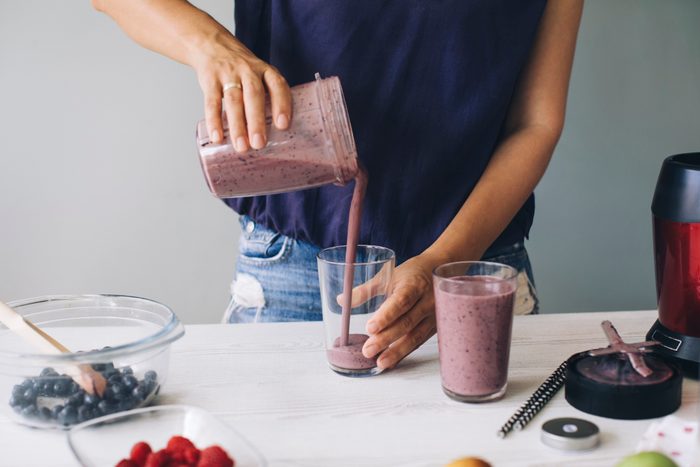
Think twice about your smoothie habit
If you’ve jumped on the post-workout smoothie or juice bandwagon, you might notice stronger digestive health but weaker enamel. All of that sugar—natural or added—is working against you. “There are many benefits of having homemade smoothies and juices, however overzealous use can lead to negative consequences,” Dr. Gamble explains. “Many fruit juices you find in stores have sugar added to them. And the natural sugars alone can be harmful to your teeth.” As a result, he adds, you can still get cavities because the oral or mouth bacteria are still able to produce acids that can dissolve tooth tissue.
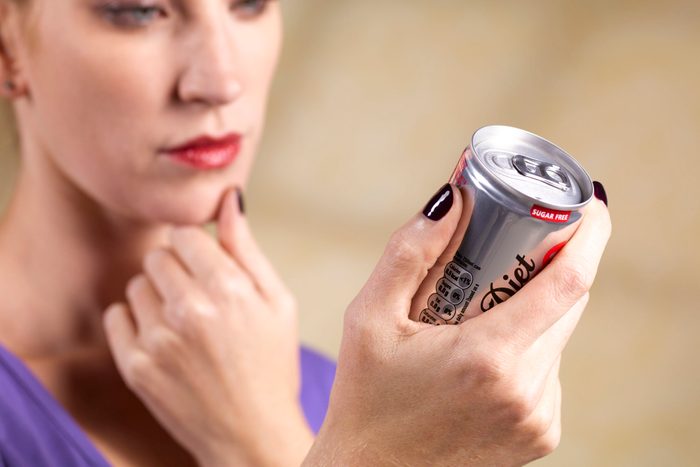
Even sugar-free soda and seltzers can harm your teeth
For people trying to trim their waistline, cutting out sugary, high-calorie drinks like soda is a no-brainer. But while sticking to sparkling water could help your weight-loss efforts, it’s not actually a great idea for your teeth. “Although the drink doesn’t contain sugar, the fact that it’s fizzy means there’s a weak carbonic acid present,” Dr. Gamble says. “This acid can wear the teeth away over time and make your teeth shorter, which contributes to looking older.”

Try not to drink at night
What’s your beverage of choice before bed? If you have a glass of red wine to soothe your anxiety from work, or let your children drink a mix of fruit juice and water, pay extra attention to brushing before you hit the hay. As Dr. Gamble explains, your teeth are less protected at nighttime than at any other time of the day. “The glands around the mouth produce less saliva as you sleep,” he says. “Saliva acts to neutralize bacteria acids that produce cavities. It takes time, however, for the saliva to buffer cavity acids, so dentists recommend that you refrain from eating or drinking (apart from water) at least an hour before you go to bed,” he says.
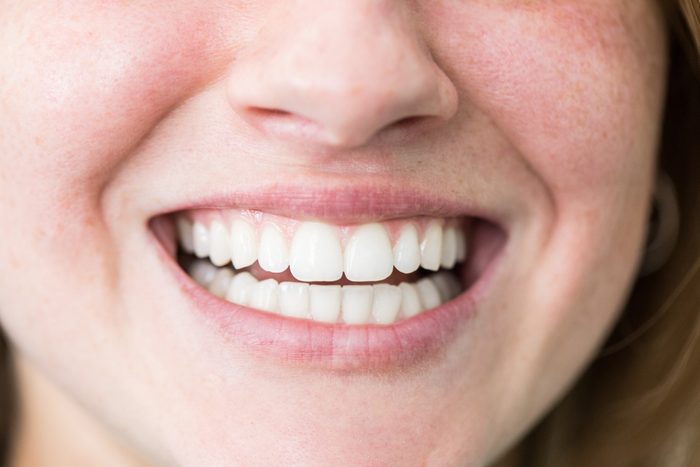
There may be a problem even if there’s no pain
When something hurts, you try to fix it, especially if you’re in a lot of pain. However, most dental health issues may go undetected by the average person, even though your dentist can catch a concern before it becomes dangerous. “Most dental problems start as small and easy to fix problems, and there usually is no associated pain during these early stages,” Dr. Gamble says. “Unfortunately, when patients don’t have any symptoms, they have a mistaken belief that there is no problem.” He recommends getting regular checkups to ensure that everything is OK, or to flag any problems that require early intervention.
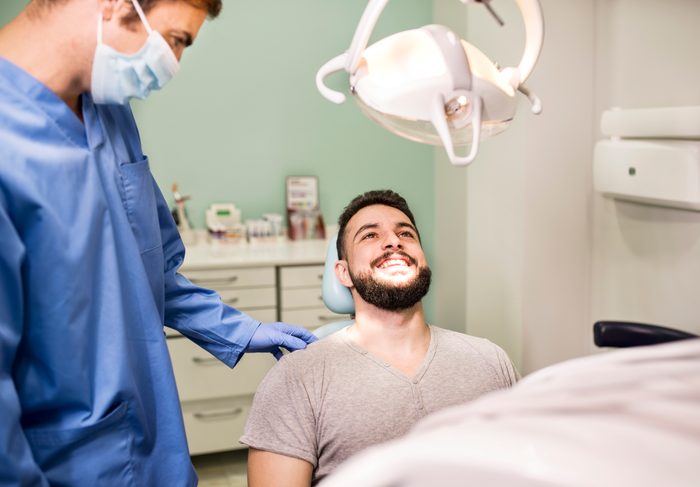
Your smile is an important investment
Though dentistry is limited (if not completely left out) on most health insurance plans, dentists not only want to see you, but they have feel an investment, a pride, and responsibility for one of your most prized assets—your smile! Not only because it’s part of your health, but because it’s essential to your character. Your smile can help your confidence or make you feel insecure; It can be a source of pleasure or something you try to hide. That’s why Paul Sussman, DDS, a dentist at the Center for Cosmetic Dentistry says an investment in your smile is well worth the medical upkeep and attention. “Your smile is the first thing we notice when we meet people,” he says. “A beautiful smile will help you feel better about yourself, get a new job, or get a better job, and be more successful in general. It’s the single investment you can make in yourself that can have a life-changing effect.” To really gleaming, consider whitening your teeth with these effective home remedies.
